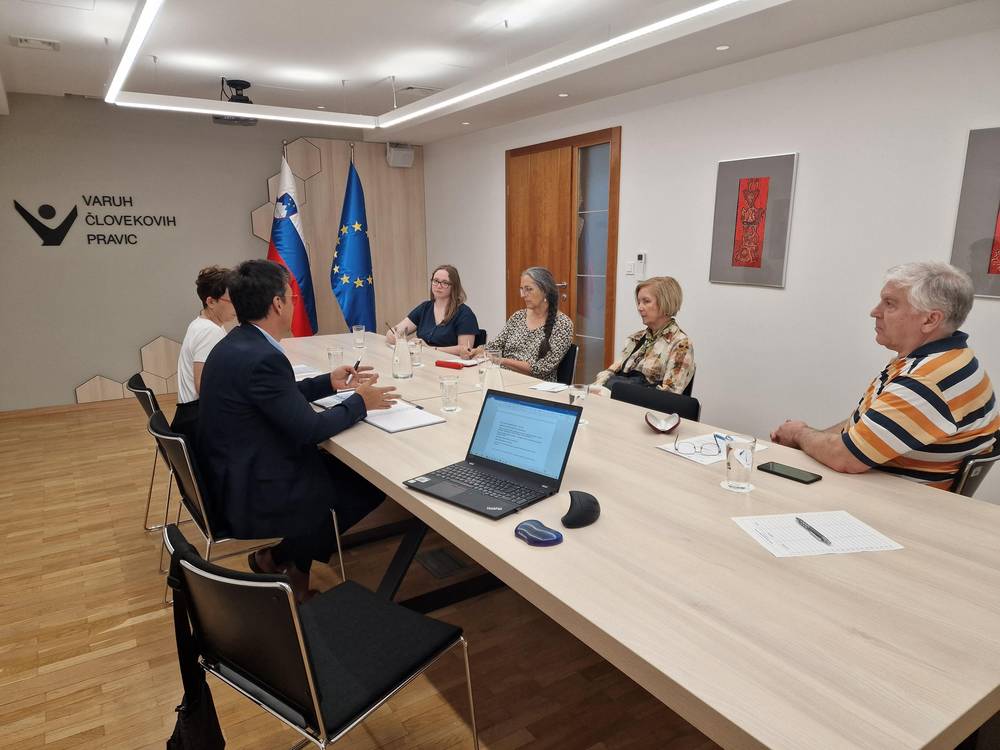Today, on 6 June 2022, at a working meeting, the Human Rights Ombudsman received representatives of non-governmental organisations responsible for the exercise of environmental and spatial rights. He regretted that the Ministry of the Environment and Spatial Planning did not implement any of the Ombudsman's recommendations for 2020 last year, which is why he reiterates them in the 2021 report. Among other things, the Ombudsman is critical of the authorities and their bodies because of inappropriate implementation of regulations, lack of inclusion of the public in the adoption of regulations, lengthy inspection procedures and poor quality of decisions. The Ombudsman expects decisive steps forward in environmental care.
Representatives of civil society point to the lack of a strategy and action plans for change and are concerned about the loose commitments related to environmental care. They expect a comprehensive approach with the involvement of all stakeholders.
They assessed that the referendum on the Water Act has somewhat halted the drastic encroachment on the environment in the last two years. However, they are concerned about the decline in decision-making standards and reduced transparency in environmental management. They note that tracking information for the purpose of the exercise of rights is becoming increasingly difficult, especially in large projects. The burning issue is financial dependence of the producers of analyses and measurements on the clients, and this issue is present everywhere in Europe, they assessed. The Ombudsman noted similar issues.
They assessed that setting up of the framework for the operation of waste incinerators must be transparent and conducted in dialogue, and above all, the economic initiative should not override concern for the environment and stop the previously adopted measures that lead to the reduction of waste. An even greater investment in changing the mindset regarding the production and use of waste is needed, and it is important to be aware of the impact of waste incinerators on the environment and public health.
They also noted the problem of decline in biodiversity and assessed that the trend of soil degradation should also be reversed. The draft strategy on soil instils the hope that soil as a non-renewable resource will be appropriately protected, they said.
They also touched on the issue of spatial acts. Many are not compliant with the relevant directives even today, and revisions are not mandatory. The state should create expert bases but is not doing so, therefore spatial acts are not development oriented. Representatives of non-governmental organisations are concerned about encroachment on space without proper permits, as restoration to the original state is impossible. It is therefore essential that the public participates in procedures and these must be transparent, said Ombudsman Peter Svetina. He also noted that implementing regulations regarding the article on water as a constitutional right have yet to be adopted, and that they should have been adopted long ago. Representatives of civil society are also concerned about the reduced possibility of protecting the public interest in regard to concern for the environment and space, as the institute of the State Attorney has often found itself in a situation where it had to represent the state, but not necessarily the public interest.
They also talked about the issues of light pollution, noise, advertising and siting of non-construction projects. They regretted that profit was being made from the protection of the environment and space, instead of truly sustainable forms of care being implemented. It is necessary to understand that a more rational use of resources will contribute to environmental protection, which can only be achieved through education, learning about expert findings on environmental impact and active participation.

![[Translate to English:] Srečanje s civilno družbo s področja okolja Srečanje s civilno družbo s področja okolja](/fileadmin/_processed_/2/d/csm_20220606_122058_4a6d1812c6.jpg)